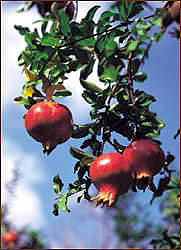
The Pomegranate Tree, Part I
Copyright 1994, 2005
After El Shaddai, the creator of the world, formed the woman and the man, El said to them, “This ground is my garden, therefore it is your garden. Everything you see is yours to touch and all the fruits of the trees are yours to eat. However, the pomegranate tree is different from the others. As long as you stay far from this tree, your days and evenings will be equal in length, and you will need to worry about nothing. But if you eat the fruit of the pomegranate, you will surely change, and that change will alter everything you know.”
El left the garden when the evening star appeared. The woman and the man lay in the grass beneath the eucalyptus tree, and its branches moved with the damp river breeze. The woman turned to the man and asked, “What did El mean by ‘change?’” She did not understand, for the leaves in the garden did not yet fall, and the oranges and pears did not yet rot.
The man did not answer her. He was asleep. The woman rose and walked toward the pomegranate tree—the tree that El said could change her.
“You might never know what change is,” a voice said near her ear. The woman looked up. A long, shimmering green serpent, burnished silver with moonlight, had wound itself around a limb of the tree.
“Who are you?” the woman asked.
“I am Knowledge,” the serpent replied. “I am the crown of the brow of El, and I advise El in all manners concerning this world.”
“Could you advise me?” the woman asked.
“What, good woman, could you possibly want me to tell you that you don’t already know?”
“I want to know what change is,” the woman said. “I want to know if I want it. El said that if the man and I ate of this fruit, we would change. Would it be a good thing if we did?”
“The serpent blinked one emerald eye, and then the other.” That would depend,” the serpent said, “on what you think a good thing is.”
The woman did not know. She turned away from the tree and returned to the man, who was still sleeping. As she lay beside him, the woman wondered, “He sleeps, so why can’t I sleep too?” But since the woman was not tired, she stayed awake and thought about the serpent whom she could still see intertwined in the branches of the pomegranate tree.
After several hours had passed, the woman was hungry. She was careful not to disturb the man’s sleep as she untangled her fingers from his hair. She walked over to a peach tree. However, the peach she ate did not satisfy her. She devoured a pineapple, and then a handful of brown olives, but after sampling fruits from almost every plant in the garden, she was still ravenous. Then, the woman approached the tree of change and reached out for one of its gold-tinged, rosy fruits. As she began to pluck the pomegranate from the branch, the serpent slid over her hand and wound itself around her wrist.
“Change hurts,” the serpent said. “Woman, if you do not eat this fruit, you will never need to choose anything, for you will have everything. Life in this garden will continue as always and El will provide all the pleasures and enjoyments you wish for. Why would you want to alter that which you already have so easily?”
The woman drew her hand away from the fruit. The serpent glided up the woman’s arm, coiled around her neck, and flicked its tongue against the inner curve of her ear. “Do you really want to lose your man as he searches for someone younger and more delicious than you?”
“He wouldn’t,” the woman said.
“He might,” the serpent countered. “You wanted me to counsel you, and now I am telling you this: Be sensible. Stay safe.”
“I don’t believe you,” the woman said. She reached for the fruit again. The woman pulled the pomegranate from the tree, bit into it, and swallowed the rind, pulp and seeds.
The serpent squeezed its body tightly around the woman’s neck. “Now, you will die,” it said.
Part II continues the story...






4 comments:
Very nice so far! What is change and why do I fear it so?
We could use your creativity for
Word Verifier: The Gathering
Level 2: The Noises Within
Now
In the Hideout.
J
It's a midrash. I love good midrashim. Did you ever check out those Sandy Eisenberg sasso books I told you about?
I don't recall you telling me about them, but I've just gone and ordered some from the library. I'm reading The Forestwife right now, by the way, and I've got the Nine Days Queen out from the library. Speaking of Midrashim, are you acquainted with When the Beginning Began, by Julius Lester? Also, a book that I just found hilarious (though it got a bit draggy toward the end) was Lamb: The Gospel According to Biff, Christ's Childhood Pal, by Christopher Moore.
No, I don't know those. I'll have to check them. We've used these 2 other good ones in First Day School (don't remember the authors) called Before There Was A Before and Does God Have A Big Toe?
OOOhhh...how are you liking The Forestwife? It's like...a feiminist text. I so adore it.
Post a Comment